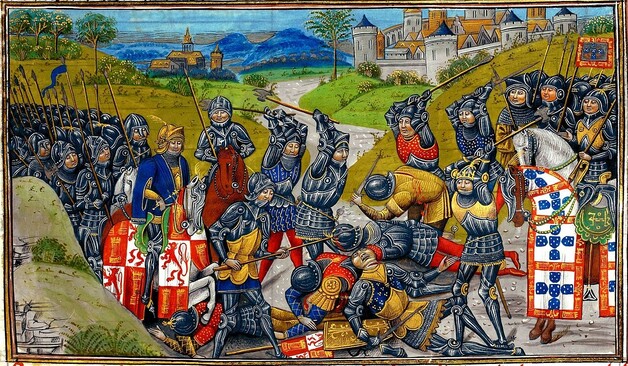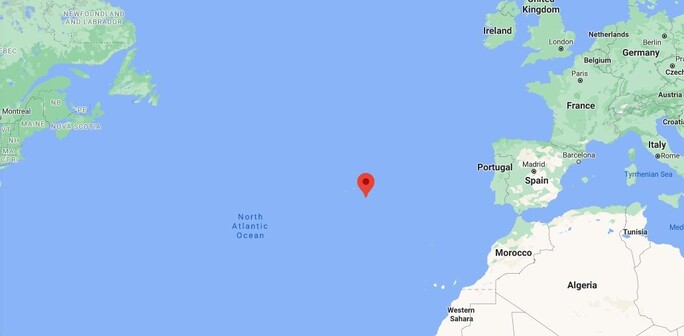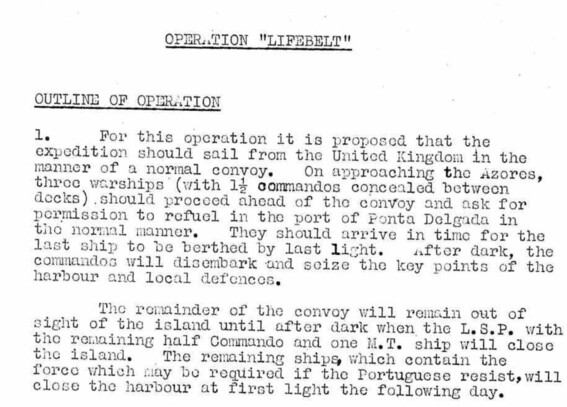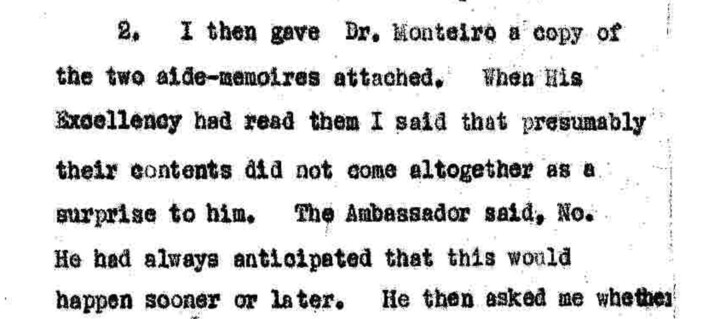On 9th May 1386 the Treaty of Windsor was signed between Portugal and England, uniting the two countries in a perpetual alliance.
It remains the oldest active alliance in the world.
In WW2 it would TWICE play a quiet but critical part in the allies' victory over the Axis, to the watching disbelief of Roosevelt and the Americans.
Here's how the treaty came about, was lost, almost got cancelled, then helped Britain in its darkest hour. /1 #history #histodons #portugal #uk
~~ wobbly lines ~~
1385 and John of Aviz is standing on a hill with 6,000 soldiers, asserting his right to be King of Portugal.
Unfortunately, at the bottom of that hill is is the King of Castile, with 30,000 Castilians, French, Aragonese and Italians who disagree.
Luckily, for John:
1) This is a REALLY steep hill to (potentially) die on
2) His enemies LOVE knights
3) He has crossbowmen
3) He has 200 battle-hardened English longbowmen.
Because the English have just pulled a Helms Deep /2
The English are there because In 1373 the Kings of Portugal and England signed a very early and vague version of the Treaty mentioned in the first post.
"Your enemies are my enemies. Forever."
John of Portugal had invoked it in hope as much as expectation. And yet...
...the English show up.
So when the Castilians and French decide to LARP the Battle of Crecy that day?
Well... /3
At the Battle of Aljubarrota, through the better generalship by John of Aviz, insane Portuguese bravery, and a LOT of bloody arrows King John wins a stunning victory and secures Portugal's place in Europe forever.
After? The Treaty of Windsor is signed.
It is now official.
The perpetual alliance between England and Portugal is proclaimed and affirmed. It will hold through centuries of warfare, Empire building by both nations and the Napoleonic wars. /4
~~ More wobbly lines ~~
It's now 1927. The British Government secretly start debating dropping the Treaty. Britain is strong. Portugal isn't. Is it in Britain's interests?
Sir Austen Chamberlain oversees a report into its value.
It IS worth keeping he says:
1) Britain shouldn't break alliances just because it can. These things matter.
2) The Navy are worried about the French taking the Azores
3) That 'perpetual' bit made the lawyers he spoke to say "Oooh. VERY interesting" in a scary way /5
And so the Alliance survives. Just. Although the Portuguese don't realise it.
Then the Nazis show up. And Franco in Spain. And France falls.
Suddenly in 1940/41 the Anglo-Portuguese Alliance is one of the tiny threads on which British survival in the war hangs, because of Portugal's prime position in relation to Britain's suddenly vital strategic interests in the Atlantic (via the Azores) and the Mediterranean.
Portugal effectively controls naval and air access to both /6
Portugal's Prime Minister (but in reality right-wing dictator) is António de Oliveira Salazar. Salazar is NOT a nice man. But he's also a pragmatist and no fan of Hitler.
He also now finds himself stuck in the middle of a tug of war for control of this strategically vital geography and some of the world's richest tungsten mines.
He's also worried about Franco invading Portugal. Siding with the then-winning Germany would neutralise that threat.
But Britain is his historic ally... /7
Salazar's Portuguese government secretly approaches the British:
Assure us Britain would still honour the alliance if we're attacked by Spain or Germany. Assure us YOU will still honour our alliance, and in return Germany will NEVER get access to the Azores.
We'll resist pressure to cut you off everywhere, even though they're clearly winning. Not only that, we will lean on Franco to remain neutral as well. /8
The British agree. They inform the Portuguese they would honour the treaty if Spain or Germany attacked Portugal.
Despite enormous German pressure, the fragile balance in the Iberian peninsular holds.
When the US joins the war and discover's this fragile thread is all that's securing the Azores and allied access to the Mediterranean, they are shocked into disbelief that Britain is trusting in a 600 year old treaty.
To the point where they start plans to invade the Azores. /9
It takes FRANTIC diplomacy on the part of Churchill and the British Foreign Office to prevent the US from invading the Azores.
The Azores are key to the war in Europe,. the Americans insist. They're in bombing range of America. They cover the Atlantic air gap. They control the undersea cables.
Control them, you win the Battle of the Atlantic.
WE KNOW Say the British.
So please stop trying to fuck this up for us. /10
Several invasions are planned, but each time the Americans are talked out of it. At one point, Roosevelt orders one planned on the bizarre idea that if BRAZIL leads the invasion, maybe the Portuguese won't react.
The British are insistent. If Portuguese sovereignty is breached, it WILL trigger a domino effect. Salazar will jump the other way and the Germans take Iberia.
Trust in the Alliance.
Files released post-war files show they were right. /11
Eventually, in 1943, with the Battle of the Atlantic raging, even Churchill finally concedes to Roosevelt's demand for an invasion. Planning for 'Operation Lifebelt' begins.
Eden as Foreign Secretary and Clem Attlee as Deputy PM finally manage to argue Churchill into pushing for an alternative.
There's a better way to do this. They say.
It's time.
Why don't WE invoke the Alliance? /12
Salazar is BIG on honour, they say. He asked us to stand by the strict terms in 1940. We did. Now is the time to YOLO it and finally flip that back on him.
We don't have to invoke the full thing. We can just invoke the mutual military aid terms in the Alliance. We ask for basing rights in the Azores, in return for 'arms' to Portugal.
This will count as the mutual military aid terms as defined. Stretched to it's absolute limit, sure, but worth a go... /13
Now Eden wasn't playing a blind hand here. Ronald Campbell, the British Ambassador in Lisbon, and the Foreign Office had been putting the hard graft in trying to build up the idea that this would be fair with their Portuguese equivalent for years, while taking careful reads of Salazar.
They had come to the realisation that by invoking the aid terms in the old alliance, written in an age of swords and muskets, it would give Salazar an out.
An out they reckon he would jump at. /14
Churchill and Roosevelt agreed to allow the approach, while planning and training for Lifebelt got underway.
In June 1943 the British OFFICIALLY invoked the mutual aid terms in the Anglo-Portuguese treaty. Azores bases in return for planes.
As predicted by Eden and Campbell, the Portuguese government were ready to bite.
According to Campbell's notes in the FO archive, They even told the British they'd been waiting in expectation of this day. /15
It was Portugal's turn to pull a Helm's Deep. Britain and ONLY Britain was granted the right to operate two airfields and one naval base in the Azores.
Hitler was furious. Salazar apologetic. He told Hitler that he was powerless but to respect the terms of the old treaty on military support, but that he was ALSO doing Hitler a favour by staying neutral so he could supply him with vital Tungsten.
"Treaties, amirite? What can you do. How are you enjoying all that Tungsten btw?" /16
With the Azores bases under British control, the 'Azores Gap' in the Atlantic could finally be closed. Supplies better routed to Europe, the East and more.
With the US forbidden from basing there, there was a brief moment of crisis when it was discovered they'd tried using the Pan-Am facility there to get round this, but under pressure from Portugal and Britain they apologised and withdrew.
In 1944, Britain quietly invoked the 'Friends to all Friends' to let them in as well. /17
And that is the full, and mostly forgotten, story of the role played by the Anglo-Portuguese alliance in WW2.
I've not seen an awful lot written about this, in English. Most of this is based on my own research in the National Archives.
A particular highlight lurks in CAB 24/189/5.
It's the report into the alliance overseen by Chamberlain, along with his recommendations.
If the government had opted to ignore his recommendations and abandon it in 1927, things may have been very different /18
As always, hope you've enjoyed this bit of unusual history. Y'all know I love the weird alliance and international law stuff.
If you have recommendations for things like that you've encountered in your own studies that you think I should look into, do let me know.
And if you want to buy me a coffee or a beer, a reminder that you can do so on Kofi.
And finally, a historical toast to Portugal.
Perpetual Friends to friends. Forever enemies to our enemies.
/END
@garius I am counting on this when the water wars start and Spain dries us out 
@garius Fascinating.
@garius I’ve always had a negative attitude towards Chamberlain. Thought he was a pushover but what a smart tactical move
@garius You should do a history of the end of the Portuguese monarchy and how the British played a role in that (not so favorable) and what happened to the PT royal family.
@garius That was fantastic, thank you. Coffee bought!
@garius Wow, thanks for this. Amazing story that I knew absolutely zero about.
@garius another brilliant thread- thanks and keep them coming!!
(Kofi tip left)
@garius I just read this whole thing out, story time style, to my husband. Your style of writing is fantastic. Setting myself a reminder to add to your ko-fi as soon as funds allow x
@Affienia glad you enjoyed it!
I worked out many years ago that the best way to approach story-telling on Twitter (and now Mastodon) is to pretend you're telling the story to friends in the pub. You need the same tone, and you have the same amount of time to do it before attention wanders.
You can actually hear me reading out one of my own twitter threads here: https://www.youtube.com/watch?v=2v5NCJ4ZnzU
@garius oh my word, that was wonderful. I now have added travelling to Ilford to visit the grave of Able Sea cat Simon to my to do list.
@garius footnote, i wonder if the fact that salazar and franco were of a clerical-fascist bent rather than an anticlerical one (mussolini, though he did come to an arrangement with the vatican, and hitler) was a factor in them staying neutral. see also: de valera, who decided at the last minute not to be a fascist, had an even more, if possible, holy catholic vision of his country, and was also neutral (with a few canny exceptions, implemented quietly).
@twobiscuits @garius Your assertion that Devalera decided at the last minute not to be a fascist is ignorant ahistorical claptrap. He did his level best to assert Irish neutrality as a test of the country's sovereignty, having managed to negotiate the return of ports occupied by the British navy shortly before the war (failure would have seen Ireland, w an army of 6,000, bombed) and agreed numerous measures to assist the Allies. Read a book FHS. Robert Fisk "In Time of War" eg.
@samueljohnson @garius oh I think if you read enough books, you'll discover that early fianna fáil were quite fascinated with the mussolini regime and adopted several aspects of it, though they didn't go for an actual dictatorship.
@twobiscuits @garius I have read plenty and refute your assertion as complete claptrap.
@garius absolutely fascinating, thank you!
@garius
Now that is one ~*heck*~ of an alternate history...!
@garius
Just to nitpick on this delicious thread: The alliance had been written in the age of swords, and a century before the age of muskets. CHRIST that's old
@notsoloud yes, the Anglo-Portuguese alliance pre-dates muskets but was also rewritten and renewed several times. Windsor was just the first proper iteration.
Indeed I found evidence that at one point Britain LOST our only copy, and were too scared to ask the Portuguese for a copy. So renewed its terms based on a version in a history book.
When they later got a copy of the original from the Portuguese it contained way LESS obligations.
A valuable lesson always ask for a copy of the source
@garius @notsoloud absolutely fascinating thread. If you’re looking for threads to pull at in future, the Auld Alliance between Scotland and France in 1296 might be an interesting one. I believe the last time it was invoked was in 1513, but it seems DeGaulle referred to it during the Second World War. Who knows, it could have implications with regard to the current impasse between Scotland and England regarding independence
@peterbrown @garius @notsoloud IIRC the Auld Alliance was formally dissolved as part of the Entente cordiale, though I don't have the references to hand.
@garius you make this stuff interesting. Thank you!







